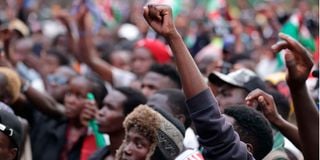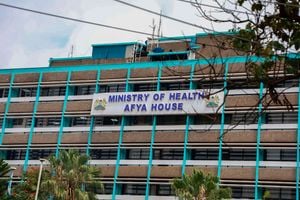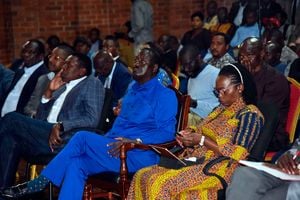
Youth attend Shujaa Memorial Concert at Nyayo Gardens in Nakuru Town on July 28, 2024. The event was held in remembrance of all those who were killed by police during the anti-government protests in the country.
Street protests and other demonstrations in public spaces are not just political activities, they are also sites of a legitimacy contest between private citizens, howsoever organised and mobilised, and agencies of the state.
The irony of the situation - that the state, being the instrument of the people's will, should find itself at odds with citizens as they seek to exercise fundamental rights and freedoms - is neutralised by the critical caveats which define the Bill of Rights, qualifying both rights and freedoms as well as state authority.
Consequently, it remains essential to concentrate analytical focus on the underlying dynamic tension on the streets, between citizen's need to achieve maximum expression of their political agenda, and the state's interest to preserve public order and security, thereby protecting both the mobilised citizens as well as others going about their business.
The relationship between the rights and freedoms of citizens on one hand and the authority of the state on the other, is anomalously bereft of that ‘binarity’ which defines ordinary regulatory dynamics.
As an agency of collective endeavour, the state exists, in principle, to maximise the well-being of citizens by facilitating the enjoyment of rights and freedoms to the greatest possible extent, while taking measures to prevent a devolution to zero-sum realisations, or outright descent into anarchy.
Restrictions on liberty at the behest of the state are only legitimate to the extent that they are necessary to protect legitimate interests in the broader publi interests . In other words, the state is authorised to justly inflict pain on citizens for their own ultimate good.
The apparent tension between the liberty of citizens and state authority can be articulated in terms of a fundamental unity on a different, citizen-centred analytical register.
Accordingly, there exists a continuum along which the inverse correlation between citizen autonomy and the state authority can be inscribed, with coordinates at each point in the progression indicating the extent to which the collective interest subsists, or anarchy prevails.
This is why during street-level encounters, whatever citizens and state agencies do, or do not, matters.
The fullest degree of citizen autonomy: when they are entitled to exercise liberty to its fullest extent (and the state is obligated to leave them well alone) is when the citizens do not present any threat to others, or to public order or safety.
In response to threats to citizens' safety and material interests, the state must robustly assert its presence in proportion to the prevalent delinquency, thereby curtailing the freedom of affected citizens accordingly.
Insofar as citizens are implicated in incremental propensity to cause harm or endanger others, the state must likewise escalate not just its presence, but also the assertiveness of needful corrective interventions leading to corresponding diminution of the citizen's rights and contraction of their freedom of action.
It follows as a matter of ineluctable necessity, that extremely ungovernable conduct on the part of citizens must elicit a commensurately condign response from the state, at which point the citizens have effectively relinquished their autonomy and liberty, and the state, concomitantly, acquires the authority to impose its utmost authority by all means at its disposal, including lethal violence.
Going by the prevailing institutional regime, it is the express intention of public policy that the character and temper of public assemblies and like gatherings be a function of citizen prerogative, as expressed through individual and collective conduct in demonstrations, protests and suchlike.
Conversely, the state must be inert a priori, moving only with just cause, activated by the express will of citizens directly facilitate and promote citizen endeavour in the first instance, or alternatively, indirectly by taking decisive measures to protect the broader public interest through vigorous enforcement of the rule of law and public order.
In short, it is the people on the street who command the agencies of state to mobilise, and dictate the modalities of engagement with them.
It was not always this way; only a few decades ago, what we now take for granted as fundamental freedoms and rights were mere privileges and accommodations arbitrarily extended as favours by bureaucrats, to politically aligned citizens and groups.
Pro-government demonstrations were lavishly favoured and indulgently facilitated, whilst protests or agitations for constitutionalism, competitive democracy and respect for human rights were explicitly proscribed and dangerous undertakings.
Then, state authority was absolute and unassailable, while citizen autonomy was largely imaginary.
A radical implication under the constitutionally inverted dynamic is that citizens have far greater control over, and accountability for how matters proceed on the streets.
Citizens exclusively own the power to safeguard their rights and freedoms by acting lawfully in exercise of their rights and freedoms.
However, they incrementally forfeit their rights and freedoms in proportion to the escalation of violence, risk of harm or other threat to the public interest at their instance.
This is an underappreciated, yet highly ultimately consequential implication of popular sovereignty.
The writer is an Advocate of the High Court of Kenya









